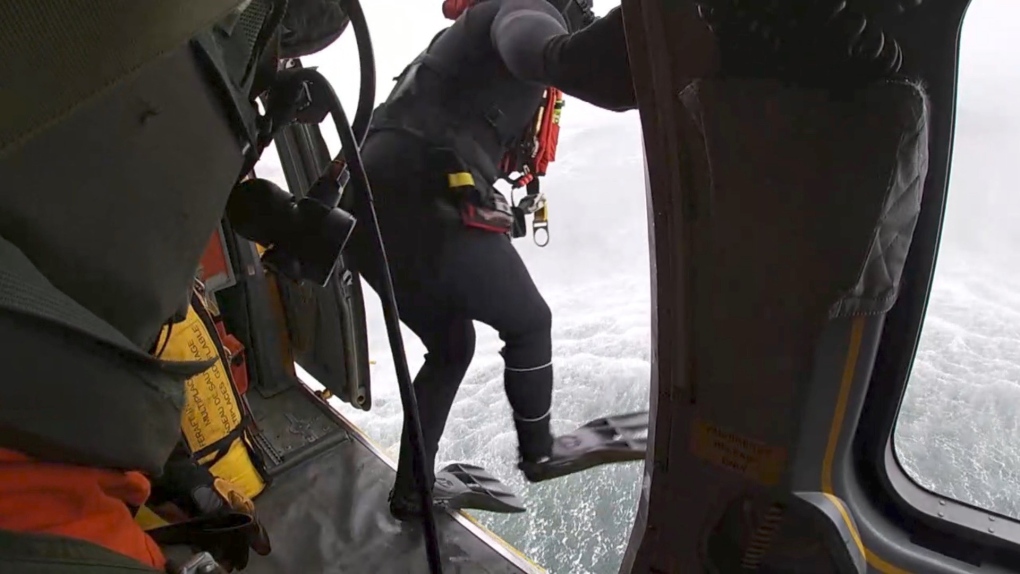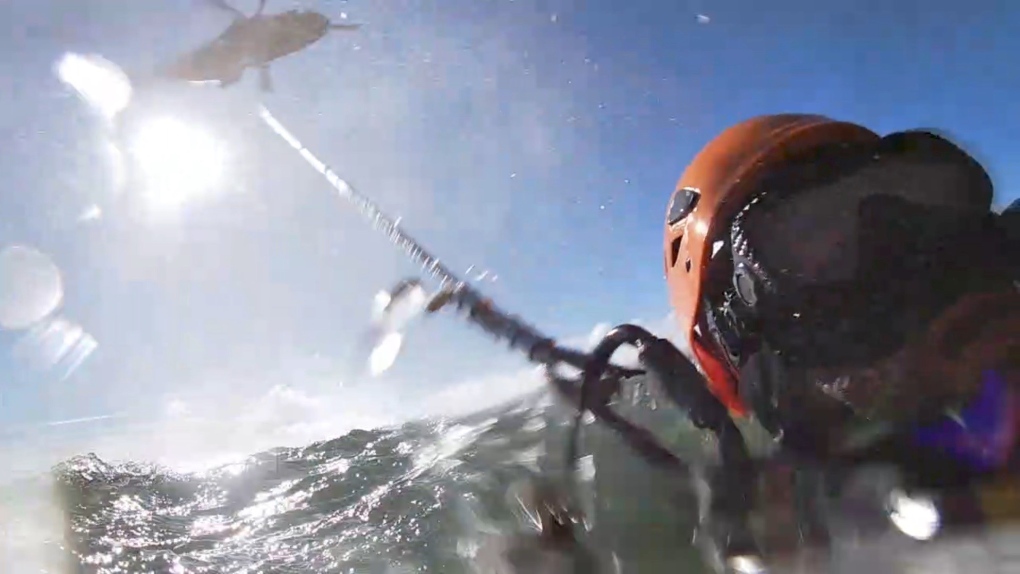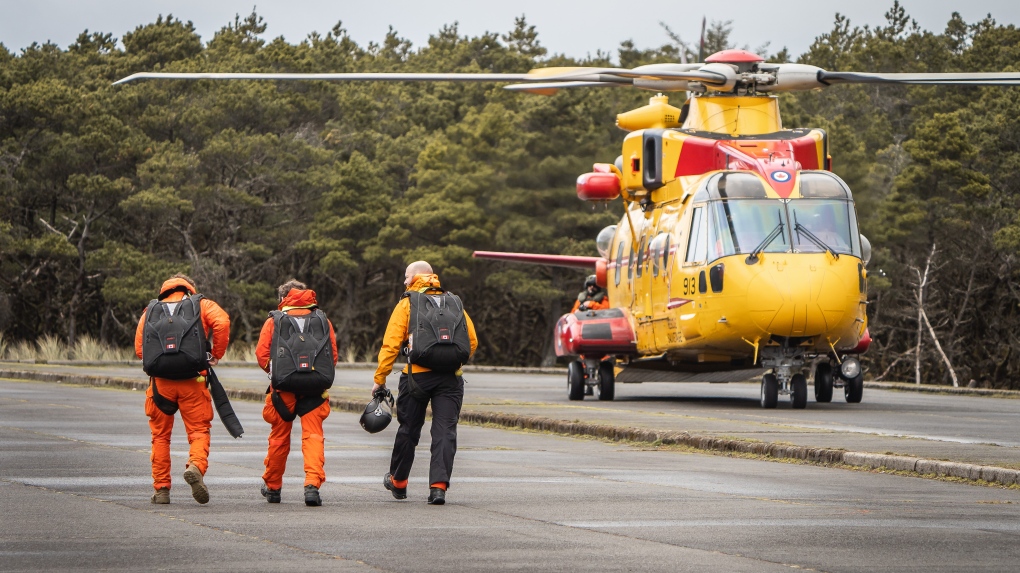Vancouver Island military search and rescue crews train with U.S. Coast Guard
Crews from 19 Wing Comox are back on the ground after attending a week of specialized training in the United States, learning special techniques to get in and out of extreme ocean waves.
"It was awesome to be able to train in a more realistic environment, out of our normal rules," said Master-Cpl. Carl Mozienko of Comox's 442 Transport and Rescue Squadron.
Three pilots, two flight engineers and three search and rescue technicians, spent five days training with members of the U.S. Coast Guard down in Astoria, Oregon, near the mouth of the Columbia River.
The location was chosen because of its rough seas, according to Brad Pigage, a chief aviation survival technician for the Advanced Helicopter Rescue School .
"Cape Disappointment is known for being the graveyard of the Pacific, so a lot of big waves, heavy surf, bad weather, low visibility, all that stuff you can expect right there," he said.
"At the school we pride ourselves at putting these air crew and rescue swimmers and SAR techs through a higher intensity situation, high-risk training, and we mitigate the risk by having more ground party and safety measures in place," said Pigage.
Cpt. Joseph Jacques was one of the Cormorant pilots taking part in the training.
"The U.S. Coast Guard, they’re the subject matter expert in terms of high-surf training, and that school specifically, so we definitely learned a lot from them," he said.
While the SAR techs were the ones diving into the cold ocean, the pilots and crew members onboard the helicopter had their own tasks to master.
 (442 Transport and Rescue Squadron)Jacques says the Cormorant typically hovers around 1.5 metres to three metres above the water but had to stay higher due to the high waves and breaking surf.
(442 Transport and Rescue Squadron)Jacques says the Cormorant typically hovers around 1.5 metres to three metres above the water but had to stay higher due to the high waves and breaking surf.
"We had to adjust our procedure to stay higher and look at the waves, count the waves, communicate between the crew members as to how low it’s safe to descend, and then timing the exit for the SAR-tech to jump on the crest of the waves," Jacques said.
While the crews regularly practice their techniques around the Comox Valley, they do so in fresh water environments avoiding salt water, which is much harder on the aircraft.
"We don’t really typically do it, so it’s only going to be in operations," said Mozienko.
"So we can end up being in that situation without really realistic training," he said. "But going down there gave us that opportunity to swim in big waves."
 (442 Transport and Rescue Squadron)The course also included vertical cliff rescues, urban search and rescue, as well as cave rescues.
(442 Transport and Rescue Squadron)The course also included vertical cliff rescues, urban search and rescue, as well as cave rescues.
"You learn how to enter the cave and going out of the cave and learn how to use the helicopter to get yourself out of it as well, because the currents are going to be different and you don’t want to be stuck inside," Mozienko said.
While the American rescue crews use smaller helicopters than the Cormorant, working alongside their southern counterparts gave the crew from Comox the chance to share techniques.
"They’re flying the MH60 and the 65, the J-Hawk and the Dolphin, which are way smaller," said Jacques.
"They don’t have the same drown draft on their helicopter, don’t have the same weight and references, so we have to tweak the techniques a little bit," he said.
 (442 Transport and Rescue Squadron)
(442 Transport and Rescue Squadron)
CTVNews.ca Top Stories

Widow looking for answers after Quebec man dies in Texas Ironman competition
The widow of a Quebec man who died competing in an Ironman competition is looking for answers.
Tom Mulcair: Park littered with trash after 'pilot project' is perfect symbol of Trudeau governance
Former NDP leader Tom Mulcair says that what's happening now in a trash-littered federal park in Quebec is a perfect metaphor for how the Trudeau government runs things.
World seeing near breakdown of international law amid wars in Gaza and Ukraine, Amnesty says
The world is seeing a near breakdown of international law amid flagrant rule-breaking in Gaza and Ukraine, multiplying armed conflicts, the rise of authoritarianism and huge rights violations in Sudan, Ethiopia and Myanmar, Amnesty International warned Wednesday as it published its annual report.
Photographer alleges he was forced to watch Megan Thee Stallion have sex and was unfairly fired
A photographer who worked for Megan Thee Stallion said in a lawsuit filed Tuesday that he was forced to watch her have sex, was unfairly fired soon after and was abused as her employee.
Amid concerns over 'collateral damage' Trudeau, Freeland defend capital gains tax change
Facing pushback from physicians and businesspeople over the coming increase to the capital gains inclusion rate, Prime Minister Justin Trudeau and his deputy Chrystia Freeland are standing by their plan to target Canada's highest earners.
U.S. Senate passes bill forcing TikTok's parent company to sell or face ban, sends to Biden for signature
The Senate passed legislation Tuesday that would force TikTok's China-based parent company to sell the social media platform under the threat of a ban, a contentious move by U.S. lawmakers that's expected to face legal challenges.
Wildfire southwest of Peace River spurs evacuation order
People living near a wildfire burning about 15 kilometres southwest of Peace River are being told to evacuate their homes.
U.S. Senate overwhelmingly passes aid for Ukraine, Israel and Taiwan with big bipartisan vote
The U.S. Senate has passed US$95 billion in war aid to Ukraine, Israel and Taiwan, sending the legislation to President Joe Biden after months of delays and contentious debate over how involved the United States should be in foreign wars.
'My stomach dropped': Winnipeg man speaks out after being criminally harassed following single online date
A Winnipeg man said a single date gone wrong led to years of criminal harassment, false arrests, stress and depression.
































